What is Oral & Maxillofacial Surgery?
Oral and maxillofacial surgery (OMFS) is a specialized branch of surgery focusing on the face, jaws, mouth, and related structures. It handles both hard tissues (bones, teeth, jaw) and soft tissues (skin, gums, muscles). According to the NHS (UK), oral & maxillofacial surgeons diagnose and treat diseases, injuries, and defects in these areas, ranging from minor tooth impactions to severe facial trauma, congenital anomalies, oral cancers, disorders of the temporomandibular joint (TMJ), and complex jaw deformities.
Common Conditions Treated in Maxillofacial Surgery
OMFS covers a wide variety of medical conditions, including but not limited to:
- Facial trauma and fractures — injuries from accidents, falls, or sports that harm the bones of the face or jaw. In a study from Hofuf, Saudi Arabia, fractures of the mandible and midface made up a large part of trauma surgery cases.
- Jaw misalignment (Orthognathic Surgery) — when upper and/or lower jaws are not aligned properly, causing problems with bite, speech, chewing, or aesthetics.
- TMJ (temporomandibular joint) disorders — pain or dysfunction in the jaw joint.
- Cleft lip & palate repair — congenital defects where the lip or roof of the mouth has not formed properly.
- Oral pathology & tumors — benign or malignant growths in the mouth, jaws, or other facial structures. For example, a Saudi study showed a high percentage of oral cancer patients present at late stages, emphasizing the need for early referral to maxillofacial surgical services.
- Reconstructive surgery & bone grafts — after trauma, tumor removal, or congenital anomalies, restoring both function and appearance.
- Dental implants, removal of impacted teeth, cysts, infections, etc.
Diagnosis & Treatment Planning
When someone consults an OMFS, the path typically includes:
- A detailed medical and dental history, imaging (e.g. X-rays, CT scans) and sometimes 3D modeling to understand anatomy.
- Interdisciplinary assessment: some cases involve ENT, plastic surgery, orthodontics, oncology depending on the condition.
- A treatment plan that balances functional restoration (chewing, speaking), aesthetic outcome, and patient preferences. For example, in decisions of jaw surgery or reconstruction, both the severity of deformity and the patient’s expectations are important factors. In Saudi Arabia, research shows that awareness of potential benefits is high, but decision-making is influenced by surgeon reputation and cost.
Why Tam Dental is a Trusted Choice in Jeddah
If you are living in Jeddah—whether as an expat or citizen—and are considering any procedure in oral & maxillofacial surgery, here’s why Tam Dental offers strong advantages:
- Our surgeons are internationally trained. Many hold certifications, fellowships, or board qualifications from outside Saudi Arabia.
- They speak both English and Arabic fluently. This ensures that regardless of your background, communication is clear and you understand all treatment steps.
- Tam Dental uses modern technology—advanced imaging, digital planning, possibly computer-assisted methods—to provide precise treatment and better outcomes.
- We handle a wide range of maxillofacial cases under one roof: facial trauma, jaw deformities, TMJ disorders, cleft lip & palate repairs, implants and reconstructive surgeries.
What to Expect When You Choose Tam Dental for OMFS
When you book a consultation at Tam Dental for oral & maxillofacial concerns:
- The surgeon will review your medical/dental history, conduct imaging (X-ray/CT/3D if needed), and explain what the issue is—e.g. whether it’s a trauma, misalignment, congenital, or pathological.
- A personalized treatment plan is developed, outlining possible options, risks, timeline, expected recovery, and aesthetic outcomes.
- During surgery or treatment, state-of-the-art techniques are used, always with patient safety and comfort in mind.
- After treatment, follow-up and possible rehabilitation (e.g. physiotherapy for TMJ, follow-ups for implants or reconstruction) are part of care.
Conclusion
Oral & Maxillofacial Surgery is a vital specialty for anyone in Jeddah needing treatment for facial trauma, jaw problems, congenital conditions like cleft lip/palate, TMJ issues, oral pathology, or reconstructive work. The treatments can restore function, improve appearance, and enhance quality of life.
At Tam Dental, we combine international surgical expertise, dual-language fluency, modern techniques, and patient-centered care. If you think you or a family member may need oral & maxillofacial treatment, please consider booking a consultation with us to evaluate your case and explore your options.
👉 To learn more or request a consultation, you can view our surgeon profiles here: Tam Dental Doctors.
FAQs
Q1: Is maxillofacial surgery very painful or risky?
All surgeries carry some risk. But OMFS surgeries are done by specialists and with proper anesthesia, pre-surgical planning, and post-surgical care, pain and risks are minimized.
Q2: Will I have a lot of visible scars?
Depending on the condition and surgery type. Many procedures are done inside the mouth or use incisions in natural folds to minimize visible scarring. Surgeons aim for both functional and good cosmetic results.
Q3: How long is recovery?
Recovery depends on the surgery: minor procedures (e.g. tooth removal, small soft tissue repairs) recover in a few days to a couple of weeks; bigger surgeries (jaw realignment, major reconstruction) may need more weeks/months with follow-ups.
Q4: Do foreign patients or expats get good care? Are doctors comfortable communicating in English?
Yes. At Tam Dental, many of our maxillofacial surgeons are internationally educated and fluent in English and Arabic, so communication is clear. Records, explanations, consent forms etc. are handled in both languages.
